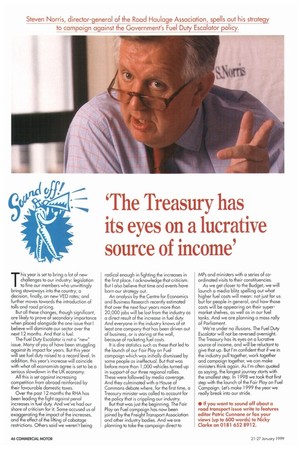'The Treasury has its eyes on a lucrative source of income'
Page 48

If you've noticed an error in this article please click here to report it so we can fix it.
This year is set to bring a lot of new challenges to our industry: legislation to fine our members who unwittingly bring stowaways into the country; a decision, finally, on new VED rates; and further moves towards the introduction of tolls and road pricing.
But all these changes, though significant, are likely to prove of secondary importance when placed alongside the one issue that I believe will dominate our sector over the next 12 months. And that is fuel.
The Fuel Dube Escalator is not a "new" issue. Many of you of have been struggling against its impact for years. But this year will see fuel duty raised to a record level. In addition, this year's increase will coincide with what all economists agree is set to be a serious slowdown in the UK economy. All this is set against increasing competition from abroad reinforced by their favourable domestic taxes.
Over the past 12 months the RHA has been leading the fight against penal increases in fuel duty. And we've had our share of criticism for it. Some accused us of exaggerating the impact of the increases, and the effect of the lifting of cabotafge restrictions. Others said we weren't being radical enough in fighting the increases in the first place. I acknowledge that criticism. But I also believe that time and events have born our strategy out.
An analysis by the Centre for Economics and Business Research recently estimated that over the next four years more than 20,000 jobs will be lost from the industry as a direct result of the increase in fuel duty. And everyone in the industry knows of at least one company that has been driven out of business, or is staring at the wall, because of rocketing fuel costs. It is dire statistics such as these that led to the launch of our Fair Play on Fuel campaign which was initially dismissed by some people as ineffectual. But that was before more than 1,000 vehicles turned up in support of our three regional rallies. These were Followed by media coverage. And they culminated with a House of Commons debate where, for the first time, a Treasury minister was called to account for the policy that is crippling our industry. But that was just the beginning. The Fair Play on Fuel campaign has now been joined by the Freight Transport Association and other industry bodies. And we are planning to take the campaign direct to
MPs and ministers with a series of coordinated visits to their constituencies.
As we get closer to the Budget, we will launch a media blitz spelling out what higher fuel costs will mean: not just for us but For people in general, and how those costs will be appearing on their supermarket shelves, as well as in our fuel tanks. And we are planning a mass rally of Parliament.
We're under no illusions. The Fuel Duty Escalator will not be reversed overnight. The Treasury has its eyes on a lucrative source of income, and will be reluctant to give that up. But I'm confident that if we in the industry pull together, work together and campaign together, we can make ministers think again. As I'm often quoted as saying, the longest journey starts with the smallest step. In 1998 we took that first step with the launch of the Fair Play on Fuel Campaign. Let's make 1999 the year we really break into our stride.
















































































































